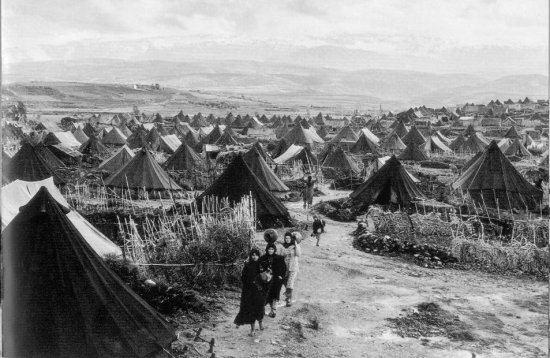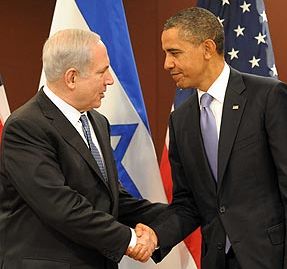“Israel and the US are one and the same: the US is Israel, and Israel is the US. Israel doesn’t want to give the Palestinians anything and Obama can’t do anything without Israel because Congress is pro-Israel.”
That’s how Marwan Jubeh, a shop owner in Ramallah, neatly sums up the situation.
If there was an honest element in President Obama’s speech at the UN General Assembly yesterday, it was implicit rather than directly spelled out: it was in effect a declaration of impotence.
And as Obama shifts into gear in his campaign for re-election, he will be grateful for the kosher seal of approval he just got from Israel’s political leaders which he can deploy as often as necessary over the next twelve months to signal that for both Democrats and Republicans, Israel and the US are one and indivisible — even when the president’s middle name is Hussein.
“I think it’s in our national interest, and Israel’s national interest, that we have a strong partnership and that the president is perceived as a friend and ally of Israel. While he does that, everybody should be happy.” So says Bob Turner who — even though he just rode to victory in New York’s 9th Congressional district through a campaign that presented Obama as no friend of Israel — now says that he does not see Israel as a wedge issue.
So now that Obama has once again burnished his credentials as a stalwart friend of Israel, he will be only too happy to set aside any expectation that the US, under his leadership, has a constructive role to play in ending the conflict.
Meanwhile, as Obama insists that the current Palestinian bid for statehood will make no difference, as Henry Siegman argues, it may actually completely change the power dynamics as the Palestinians begin to assert their right of self-determination.
The outpouring of commentary on the request that Palestinians intend to submit to the United Nations to affirm their right to statehood within the pre-1967 borders has fallen into two categories. The first supports the Israeli and American view that sees the Palestinian initiative as endangering the Oslo Accords and prospects for a two-state solution. As described by President Obama, it is a “distraction” from the serious business at hand. The second view supports the Palestinian right to apply for UN membership, or for non-member-state observer status, and rejects the notion that this would set back the peace process.
However, both approaches believe that UN action will not result in any practical changes on the ground and that Palestinians will have to return to the U.S.-orchestrated “peace process” to achieve a two-state solution. And both have in common a profound misreading of the significance of the Palestinian initiative, which is likely to be transformative, changing the rules of the game for Israeli-Palestinian peacemaking.
According to the prevailing rules, every aspect of the Palestinians’ existence depends on Israel. Whether Palestinians can travel from town to town within the areas to which they are restricted, open a new business venture, see their homes demolished by an Israeli bulldozer—indeed whether they will live or die—are Israeli decisions, often made by armed Israeli eighteen-year-olds just out of high school.
The Oslo Accords, requiring as they do that Israel withdraw its occupation in stages from the West Bank, were intended to change that reality. But Oslo was quickly undermined by Prime Minister Yitzhak Rabin, who declared—“unilaterally”—that the dates established in the accords for the withdrawals are not “holy” and can be ignored by Israel. Furthermore, as noted by Uri Savir, who headed Israel’s Foreign Ministry at the time, Rabin had no intention of returning the Jordan Valley or of sharing Jerusalem. (He might well have changed his views on these issues, as he did on some others, had he not been assassinated by a settler.)
Although the Oslo Accords did not mention a Palestinian state, statehood was the goal implicit in the agreement’s terms and the permanent-status issues slated for negotiations between the parties. But the peace process overseen by the United States was based on an unstated principle that fatally undermined the achievement of a Palestinian state: that any change in the Palestinians’ status as a people under Israel’s occupation depended entirely on Israel’s consent. This effectively excluded everyone other than the occupiers from a role in deciding the Palestinians’ fate. The UN, which was established to assure compliance with international law and to facilitate the self-determination of peoples living under colonial domination, was shunted aside. Above all, this principle excluded the Palestinian people themselves.
To be sure, President Obama recently proposed that negotiations begin at the 1967 lines, with territorial swaps. What he failed to say is that if the parties cannot reach agreement on the swaps, the lines will be drawn by the Security Council. Indeed, he said the opposite—that peace terms cannot be imposed on Israel. His proposal therefore changed nothing. Netanyahu can continue to make demands he knows no Palestinian leader can accept, and the occupation persists.
The real meaning of the Palestinians’ decision to defy the United States is that they will no longer accept their occupier’s role in their quest for statehood. They demand national self-determination as a right—indeed, as a “peremptory norm” that in international law takes precedence over all other considerations—and not as an act of charity by their occupiers.
The American insistence on aborting the Palestinians’ initiative and returning them to a peace process in which their fate remains dependent on Israel is shameful. It stains America’s honor. It will not succeed, for the Palestinian decision to defy the American demand is itself a declaration of independence; that genie cannot be returned to the bottle.
On the ground, little will be changed by a UN affirmation of Palestinian statehood. But nothing will be the same again in the Palestinians’ dealings with Israel and the United States. The notion that Israel will decide where negotiations begin and what parts of Palestine it will keep is history. It is sad that America, of all nations, has failed to understand this simple truth, even in the wake of the Arab Spring. Sadder still is Israel’s continuing blindness not only to the injustice but also to the impossibility of its colonial dream. That dream may now turn into a nightmare as the international community increasingly sees Israel as a rogue state and treats it accordingly.




 In case anyone is in any doubt that President Obama’s comments on the Israeli-Palestinian conflict, delivered to the UN General Assembly this morning, were nothing more than a string of worthless peace-process platitudes, then listen to the rave review he got from Israeli foreign minister
In case anyone is in any doubt that President Obama’s comments on the Israeli-Palestinian conflict, delivered to the UN General Assembly this morning, were nothing more than a string of worthless peace-process platitudes, then listen to the rave review he got from Israeli foreign minister